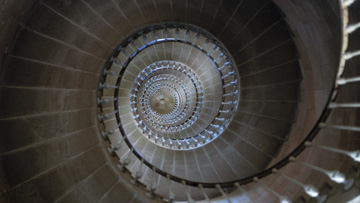The Book of Judges recounts a downward spiral: “The people of Israel did what was evil in the sight of the Lord.” “So the anger of the Lord was kindled against Israel.” “But when the people of Israel cried out to the Lord, the Lord raised up a deliverer.” “Whenever the judge died, they turned back and were more corrupt than their fathers” (2:11; 2:14; 3:9; 2:19).
Samson was the twelfth and last of the judges in this book. In many ways, the story of his life is a tragedy. He is the hero who dies in the end. Judges 16:29-30 says,
Samson grasped the two middle pillars on which the house rested, and he leaned his weight against them, his right hand on the one and his left hand on the other. And Samson said, “Let me die with the Philistines.” Then he bowed with all his strength, and the house fell upon the lords and upon all the people who were in it. So the dead whom he killed at his death were more than those whom he had killed during his life.
Three other stories intrude upon the narratives of the twelve judges. They embellish the larger story of Israel’s downward spiral into sin and degradation. None of these stories involves a judge in Israel.
The first story is the tragic life and death of Abimelech (Judg. 9). A son of Gideon, he murdered his brothers and sought to be king. In the end, “a certain woman threw an upper millstone on Abimelech’s head and crushed his skull” (v. 53). As verse 56 testifies, “Thus God returned the evil of Abimelech, which he committed against his father in killing his seventy brothers.”
Second, there is the tragic story of Micah’s shrine, household gods, and personally ordained priest (Judg. 17–18). Members of the tribe of Dan confiscated Micah’s idol and priest. “And the people of Dan set up the carved image for themselves” (Judg. 18:30).
Third, there is the story of a Levite and his concubine (Judg. 19–21). She was assaulted in Gibeah of Benjamin in a way reminiscent of Sodom. Civil war ensued. The tribe of Benjamin was nearly eradicated. The remedy was a plot to circumvent one vow by keeping another. The final words of Judges tell the tale: “In those days there was no king in Israel. Everyone did what was right in his own eyes” (21:25).
There is a fourth story appended to the Book of Judges by the translators of the Septuagint. Ruth takes place during the time of the judges, and it gives us the minority report. It is the story of how Ruth meets Boaz, a kinsman redeemer, marries him, and is restored to her deceased husband’s inheritance. As it “happens,” Ruth and Boaz are the great-grandparents of King David (Ruth 4:21-22) and part of the genealogy of Jesus Christ (Matt. 1).
The lesson of the Book of Judges is that Israel desperately needs a Savior and King. Ruth assures Israel that the Savior and King is coming. When David is born, His forerunner appears. Thus it was that Ruth gave birth to Him.
Blessed be the Lord, who has not left you this day without a redeemer, and may his name be renowned in Israel! He shall be to you a restorer of life and a nourisher of your old age, for your daughter-in-law who loves you, who is more to you than seven sons, has given birth to him (Ruth 4:14-15, italics added).
We too need this Savior and King, Jesus Christ, the Lord.
